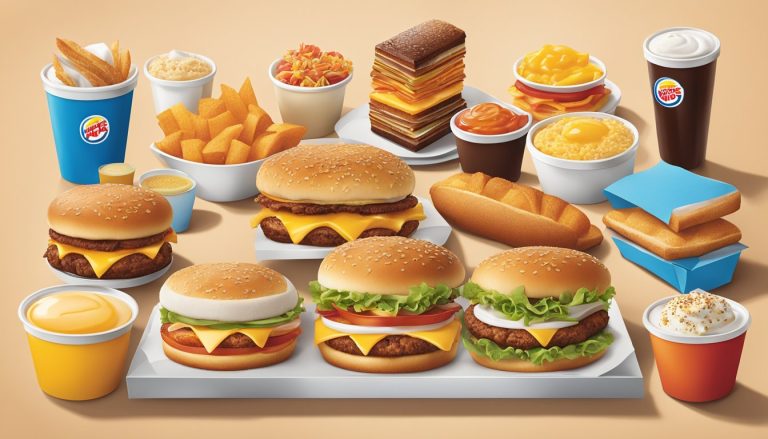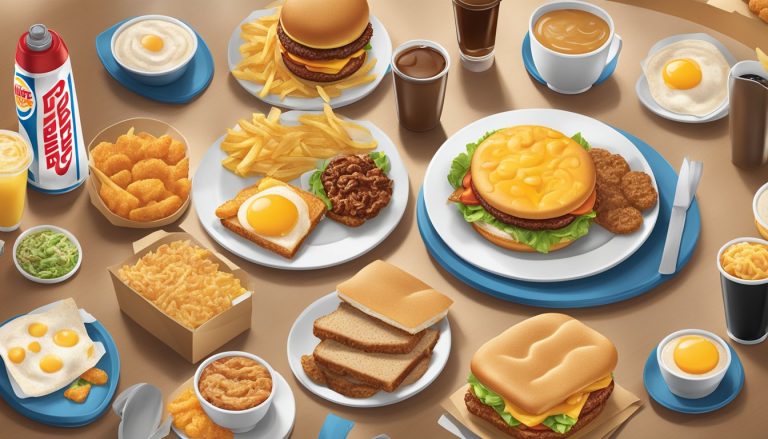Burger King has been serving breakfast to hungry customers since 1978, when it first introduced the Croissan’wich. Over the years, the fast food giant has expanded its morning menu offerings while maintaining a focus on quality ingredients.
Burger King uses real eggs in its breakfast sandwiches, sourcing them from trusted suppliers to ensure freshness and quality. The company takes pride in offering authentic ingredients to its customers, recognizing that using real eggs contributes to a more satisfying breakfast experience.
While Burger King is known for its transparency regarding certain ingredients, the company remains secretive about the source of its breakfast sausage. The sausage patties arrive at restaurants pre-made and pre-packaged, with employees often unaware of their exact origins. This air of mystery surrounding the popular breakfast meat has led to speculation and attempts by fans to recreate the savory flavor at home.
The Core of Burger King Breakfast

Burger King’s breakfast offerings center around hearty sandwiches and classic morning fare. The menu features a mix of savory and sweet options designed to kick-start the day.
Breakfast Menu Overview
The Croissan’wich reigns supreme on Burger King’s breakfast menu. This signature sandwich combines eggs, cheese, and a choice of meat on a flaky croissant. Other popular items include biscuit sandwiches and French toast sticks.
Hash browns are a staple side, offering a crispy complement to sandwiches. For those seeking a larger meal, Burger King provides breakfast platters with eggs, sausage, and pancakes.
Sweet options like cinnamon rolls and muffins round out the menu. Beverage choices range from coffee and orange juice to soft drinks.
Schedule of Breakfast Hours
Burger King typically serves breakfast from 6:00 AM to 10:30 AM. Hours may vary by location, especially for 24-hour restaurants that might offer extended breakfast times.
On weekends, some outlets extend breakfast service until 11:00 AM. It’s advisable to check with local restaurants for exact timings.
Drive-thru service often starts earlier than in-restaurant dining. Some locations begin breakfast as early as 5:00 AM to cater to early risers and commuters.
Breakfast items are generally unavailable after the cut-off time as kitchens transition to the regular menu.
Mapping Burger King’s Breakfast Ingredients

Burger King‘s breakfast menu relies on a variety of ingredients to create its signature morning offerings. The chain sources different components for its meat products, eggs, breads, and cheeses to craft its popular breakfast items.
Quality of Meat Products
Burger King’s breakfast meats include bacon, sausage, and ham. The bacon is typically pre-cooked and reheated at the restaurant. Sausage patties are formed from ground pork with added spices and seasonings. Ham slices are cured and pre-cooked before being shipped to locations.
These meat products are sourced from approved suppliers who must meet Burger King’s quality standards. The chain aims to use meats free from artificial colors and flavors where possible.
Portion sizes and cooking methods may vary slightly between different breakfast sandwiches and platters. Burger King regularly reviews its meat sourcing to balance quality, cost, and consumer preferences.
Egg Selection
Burger King uses different egg products across its breakfast menu. Some items feature freshly cracked eggs cooked on-site. Others utilize pre-made egg patties or liquid egg mixtures.
The chain has faced criticism for not using real eggs in all breakfast items. Many offerings contain a liquid egg-pasteurized mixture rather than whole eggs. This allows for more consistent cooking and longer shelf life.
Burger King has explored using more cage-free eggs in recent years. However, the transition has been gradual due to supply chain complexities. The company aims to increase its use of cage-free eggs over time in response to consumer demand for more ethical sourcing.
Bread Variants and Additives
Burger King offers several bread options for its breakfast sandwiches. The iconic Croissan’wich uses a croissant-style bun. Traditional biscuits are another popular choice. English muffins and regular hamburger buns round out the selection.
These bread products often contain preservatives to maintain freshness. Common additives include calcium propionate and potassium sorbate. Some varieties may include dough conditioners or emulsifiers for texture.
Burger King has worked to remove artificial colors and flavors from its bread products where possible. The chain balances shelf stability with consumer preferences for cleaner labels. Ingredient lists can vary by region and specific menu item.
Cheese Types & Considerations
American cheese is the primary cheese used in Burger King’s breakfast items. This processed cheese product melts well and provides consistent flavor. It typically contains milk, whey, milk fat, and emulsifying salts.
Some breakfast sandwiches may offer alternatives like cheddar or Swiss cheese. These options can vary by location and limited-time promotions. Cheese slices are pre-portioned for efficiency in assembly.
Burger King considers factors like melt performance, cost, and flavor when selecting cheese products. The chain aims to balance taste preferences with operational needs. Cheese selections may be adjusted based on consumer feedback and market trends.
Nutritional Information and Dietary Restrictions

Burger King provides detailed nutritional information for its breakfast menu items to help customers make informed choices. This data covers key macronutrients and identifies common allergens present in various breakfast offerings.
Macronutrients and Caloric Content
Burger King’s breakfast items vary widely in their nutritional profiles. The Croissan’wich with Egg & Cheese contains 340 calories, with 170 calories coming from fat. It provides 12 grams of protein and 29 grams of carbohydrates.
For those seeking lower-calorie options, the basic Hamburger offers 250 calories. Higher-calorie choices include the Breakfast Bacon King at 725 calories.
Sodium content is an important consideration. Many breakfast items contain over 600mg of sodium, with some exceeding 1000mg.
Burger King offers nutritional information on their website and in restaurants, allowing customers to track their intake of calories, fat, carbohydrates, and protein.
Identifying Common Allergens
Burger King recognizes the importance of allergen information for customers with dietary restrictions. Common allergens in their breakfast menu include:
- Eggs (present in most breakfast sandwiches)
- Milk (cheese, butter)
- Wheat (bread products)
- Soy (various ingredients)
The company provides allergen information for each menu item to help customers avoid potential triggers. Customers with severe allergies should be aware that cross-contamination may occur during food preparation.
Burger King also offers some allergen-friendly options, such as items without egg or dairy. However, the selection may be limited for those with multiple allergies.
Comparison with Other Fast Food Chains

Burger King’s breakfast offerings face stiff competition in the fast food market. The chain’s sourcing practices and menu items differ from its rivals in several key areas.
Burger King Versus McDonald’s
McDonald’s pioneered fast food breakfast in the 1970s, while Burger King entered the market later. McDonald’s Egg McMuffin remains an industry standard, using freshly cracked eggs. Burger King, in contrast, uses a mix of fresh and liquid eggs depending on the menu item.
McDonald’s sources its eggs from suppliers who meet specific animal welfare standards. Burger King has made similar commitments but lags behind in implementation. Both chains use similar pork and cheese suppliers for their breakfast sandwiches.
Burger King’s breakfast menu is more limited than McDonald’s, focusing on core items like croissants and biscuit sandwiches. McDonald’s offers a wider variety, including unique options like McGriddles and breakfast burritos.
Assessing Other Competitors
Dunkin’ and Starbucks compete with Burger King in the breakfast sandwich market, but focus more on coffee and baked goods. These chains source higher-quality coffee beans than Burger King, which impacts their breakfast appeal.
Regional chains like Whataburger and Jack in the Box offer distinct breakfast menus with locally sourced ingredients in some markets. This gives them an edge over Burger King in certain regions.
Tim Hortons, popular in Canada, sources many ingredients locally, contrasting with Burger King’s more centralized supply chain. White Castle stands out by using fresh-cracked eggs on all breakfast sandwiches, unlike Burger King’s varied approach.
Customer Favorites and Specialty Items

Burger King’s breakfast menu features several beloved items that have become customer favorites over the years. These offerings combine unique flavors and hearty portions to satisfy morning appetites.
Signature Sandwiches
The Croissan’wich stands out as Burger King’s iconic breakfast sandwich. Introduced in 1978, it pairs a buttery croissant with eggs, cheese, and a choice of meat. The Double Croissan’wich takes this concept further, doubling the protein for hungry customers.
Another popular option is the Egg-normous Burrito. This hefty breakfast item packs scrambled eggs, sausage, hash browns, cheese, and spicy cream sauce into a flour tortilla.
For those seeking a substantial meal, the Enormous Omelet Sandwich delivers. It features a sizeable omelet, cheese, and meat between toasted buns.
Unique Breakfast Selections
Burger King offers alternatives to traditional breakfast sandwiches. The Ultimate Breakfast Platter caters to customers who prefer a full breakfast spread. It includes scrambled eggs, hash browns, sausage, a biscuit, and pancakes.
For pancake lovers, the Pancake Platter provides a stack of fluffy pancakes served with syrup. This simple yet satisfying option appeals to those with a sweet tooth.
Hash Browns are a popular side item, offering a crispy potato complement to any breakfast selection. These golden-brown bites are often added to sandwiches for extra texture and flavor.
Beverage Offerings

Burger King offers a diverse range of beverages to complement its breakfast menu. From freshly brewed coffee to refreshing soft drinks, customers have multiple options to quench their thirst and kickstart their day.
Coffee Creations
Burger King takes pride in its coffee offerings. Hot coffee is available in regular and decaf varieties, brewed fresh throughout the morning. For those who prefer a cooler option, iced coffee provides a refreshing alternative.
The chain also offers specialty coffee drinks like cappuccinos and mochas. These beverages pair well with breakfast sandwiches, adding a touch of indulgence to the morning meal.
Burger King sources its coffee beans from reputable suppliers, ensuring consistent quality and flavor in every cup. The company aims to provide a comparable coffee experience to specialty coffee shops at a more affordable price point.
Additional Drink Choices
Beyond coffee, Burger King’s breakfast beverage menu includes a variety of options. Soft drinks are available for those seeking a carbonated start to their day. The selection typically includes popular cola and lemon-lime options.
For health-conscious customers, Burger King offers bottled water and juice choices. These beverages provide a refreshing alternative to caffeinated drinks.
Some locations may offer milk as a beverage option, particularly to accompany menu items like oatmeal. This nutrient-rich drink adds versatility to the breakfast beverage lineup.
Burger King’s beverage offerings are designed to cater to diverse customer preferences, ensuring that every breakfast order can be paired with a suitable drink choice.




